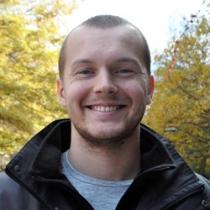
Aaron Wilks
What is your next adventure?
First of all, my wife and I will be taking a trip to Europe. After that, I'll start my job as an aeronautical engineer working on store separation in the F-35 at Lockheed in Fort Worth, Texas.
What about your next adventure are you most looking forward to?
The most exciting things is the fact that this will be a new situation for me. As I get used to my job, I'm excited to see what opportunities will be available to me. My experience at Tech is definitely going to help me - I've been pushed hard and a lot has been expected of me. But I'll have new problems and new standards to learn.
Did you have any previous co-op, internship, or research experience in this area?
My research at Tech looked at aerodynamic modeling for bluff bodies -- that's any structure that's not easy to fly. Our work has been on slung loads for rotorcraft and the problems that they create. There are power-limited speeds for rotorcraft with slung loads, but the loads can still become unstable, which, ultimately, can cause a crash. We can use flight-testing or computer simulations to discern where the problem lies. At Tech, we've focused on reduced-order modeling to determine some of the behavior. I've used high-fidelity CFD to create lower-order reduced-order modeling. We've used that to to look at the actual dynamic motion of the simulation.
With the help of Dr. Smith, I'm on two conference papers - one that was presented before AHS [now VFS] and the other for AIAA.
How did your educational experience at Georgia Tech help you to achieve your goals?
The number one thing is that I've had a great working relationship with Dr. Smith. She mainly works on rotorcraft and I'd never done that before so she really taught me. I came in as an un-funded grad student, but then Dr. Smith reached out and asked me to work for her.
The other thing I've truly enjoyed here was becoming a senator in the Georgia Tech Graduate Senate. It really helped me with my communications skills, and it gave me a feel for what administrative processes and procedures are all about. I'm pretty sure that will help when I'm working with a federal contractor.
What advice would you give to an underclassman who would like to follow the same path?
The number one thing I'd say about having a good experience at Tech is to work closely with your professors and get involved. There are a lot of opportunities to learn that youare not aware of because as an undergraduate you were exposed only to classical engineering problems. But there are unique, interesting problems that the professors are working on all the time at Tech. You don't know what you'll get exposed to unless you ask.
A lot of the trick to rotorcraft problem solving comes from the fact that they are always complex, tricky problems. The first way you might try to solve them might end up being too expensive or take too long. So you have to learn to work on complex issues using new methods. It's fascinating, but it takes time. And you definitely want the expertise you can get from a professor to back you up.